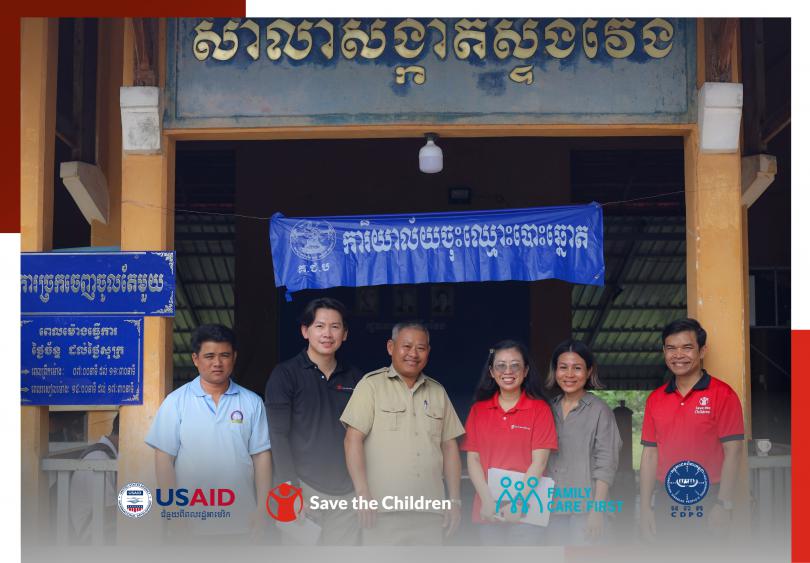How Mr. Hout Heng Empowers People with Disabilities in the Face of Climate Change

In the face of increasing climate challenges, a 55-year-old community leader Hout Heng from Steung Veng Village in Koh Kong’s Khemarak Phoumin Municipality in Cambodia has become a key advocate for including people with disabilities in disaster risk reduction efforts. As a member of the Commune Committee for Disaster Management (CCDM) and the Cambodian Red Cross Sub-Branch, Mr. Heng has dedicated himself to enhancing disaster preparedness and ensuring that vulnerable groups in his community are not overlooked.
Mr. Heng's community, like many others in Koh Kong Province, has been affected by seasonal droughts, heatwaves, and, more recently, strong winds and short-term floods. Historically, local authorities, including Mr. Heng, were reactive in addressing climate-related issues, relying heavily on humanitarian aid and support from the Cambodian Red Cross after disasters struck. There was little preparedness in place to mitigate the impact of such events, especially for vulnerable groups like people with disabilities.
“In the past, we did not pay much attention to the issue of climate change until a disaster, or its resulting impact occurred. We depended on humanitarian aid and the Equity Card (IDPoor)[1], and we focused on general citizens, not specifically on people with disabilities,” Mr. Heng said.
One of the significant challenges Mr. Heng has faced in advocating for people with disabilities is the limited awareness and understanding of their needs among local authorities and community members.
In February 2024, the Disability-Inclusive Climate Action (DCA) Project was introduced in Koh Kong Province after its launch in September 2023. The project was funded by the United States Agency for International Development (USAID) and jointly implemented by Save the Children, the Cambodian Disabled People’s Organization (CDPO), and the Disabled People’s Organization (DPOs) in the target areas in Koh Kong and Kampong Chhnang provinces.
The project organised national forums where all relevant stakeholders participated and capacity-building workshops that deepened the understanding of the connection between climate change and the rights of people with disabilities. Through his involvement, Mr. Heng gained valuable knowledge on better preparing his community, particularly the people with disabilities, for climate-related disasters.
Mr. Heng became an active participant and learned vital climate change preparedness approaches, including the importance of establishing safe evacuation spaces with accessible environments for people with disabilities. He also played a key role in organising local volunteers to assist during climate emergencies. The authorities, under his guidance, provided additional land for people with disabilities along the waterfront, enabling them to grow crops and sustain themselves despite mobility challenges. Water reservoirs have been prepared during the drought to ensure a reliable water supply for those experiencing shortages.
According to Mr. Heng, 36 out of the 92 persons with disabilities in his community have obtained the Person with Disabilities Identification Card[2], which entitles them to free healthcare.
After engaging in the DCA project, Mr. Heng has worked closely with the authorities in Sangkat Steung Veng to ensure that climate change adaptation efforts were integrated into the Commune Investment Program (CIP). By doing so, the needs of people with disabilities would become a central part of the strategy, reflecting a significant shift in how local authorities approached disaster risk reduction. Monthly meetings between representatives of DPOs and local authorities became a regular occurrence, further setting this partnership.
The involvement of people with disabilities in disaster preparedness led to significant improvements during climate-related events by making vital information and resources more accessible to all, especially vulnerable groups. Inclusive planning ensured that evacuation procedures and emergency shelters were tailored to meet the needs of people with disabilities, leading to more efficient responses during emergencies.
“We are more considerate of people with disabilities and ready to include their problems in the upcoming Commune Investment Program. I am happy to work with DPO representatives in my community,” he said.
Mr. Noun Vouch, a Program Officer in Koh Kong’s DPO, praised the close cooperation between local authorities in the project, emphasizing that Mr. Heng has been proactive, always involving the DPO representatives in disaster preparedness and prevention activities.
“I am very happy to see the authorities cooperating with us. I have never had difficulty implementing the project because they are always ready to assist us, even when not physically present,” said Mr. Vouch. “I also acknowledge the authorities’ willingness to provide directions and coordinate resources has made a difference in supporting people with disabilities during disasters.”

The broader community has welcomed the inclusion of people with disabilities in disaster preparedness, recognizing it leads to more comprehensive and equitable planning. By addressing the needs of vulnerable groups, the efforts have strengthened coordination and fostered unity, ensuring better protection for all during climate-related events.
Mr. Heng’s efforts have not only improved the preparedness of his community but have also ensured that people with disabilities are better supported in the face of climate-related challenges. He expresses his commitment to continuing this work, advocating for further training and resources to ensure that his community is fully equipped to meet the evolving demands of climate change.
“I would also like to request more training related to climate change for people with disabilities so that our authorities can gain more knowledge,” he said.
[1] The Identification of Poor Households Programme (IDPoor) in Cambodia provides Equity Cards to poor and vulnerable households to access social assistance services. The IDPoor program aims to identify poor households and provide data on them for each geographical area.
[2] The Disability Identification Card (ID) in Cambodia is a free ID card that helps people with disabilities access benefits and services.
Interviewed by: Sy Sokpor – DCA Project Officer and Vorn Chea – Senior Project Officer of CDPO
Written by: Son Senghun - DCA Project Volunteer and Taing Vida - Communications and Campaign Specialist
Photographed by: Yous Ratha, Communications Officer
Proofread by: Chin Kethya, Donor Reporting and Compliance Specialist
Signed off by: El Sotheary, ACCM Manager


